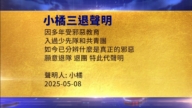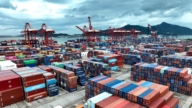【新唐人2013年06月17日讯】美国一份报告显示,来自中国大陆的移民血液中,重金属含量都远远超过其他亚洲地区的移民。报告指出,这可能与中国人的饮食有关。报告说,这一情况令人堪忧。同时,大陆官方的食品专家指出,由于环境污染造成的食品安全问题,将导致大陆“食源性疾病”随时面临爆发的风险。
一项由美国疾病控制和预防中心健康统计部门完成的调查显示,来自中国大陆的移民血液中,铅、镉、汞等重金属含量,一概高于来自其他亚洲地区的移民,其中的铅含量,更是高出44%。报告中说,这可能与中国人的饮食习惯有关。
5月,大陆各地爆发“镉大米”危机。
重庆食品工业研究所副所长周令国:“大气污染、土壤污染、环境污染,它本身这个重金属可能被这些植物吸收的,吸收之后,在植物中间存在,然后人食用之后,它可能在人体内积淤起来,这些都是污染源。现在我们的粮食、或者蔬菜,或者茶叶这些植物中,受污染的地区比较严重的。”
中共当局2010年曾经发布报告说,中国五分之一的耕地都受到了重金属污染,其中镉污染和砷污染占40%,主要集中在湖南、江西等长江以南的地区。“南京农业大学农业资源与生态环境研究所”所长潘根兴团队,在全国多个县级以上市场随机采购样品,结果发现大米的镉超标现象极为严重。
南京农业大学农业资源与生态环境研究所所长 潘根兴:“我们原来的研究,说明污染的问题,其实在生产上可能会有大面积的发生。通过采样来讲,在污染地区超标率很高,要达到百分之七十多。”
近期,大陆国土资源局放出消息说,通过正在绘制的土壤重金属污染图发现,大陆重金属污染面积有显着扩大,并向东部人口密集区扩散。
另外,有评论指出,大陆的环境污染对人体健康的危害,正在通过“食源性疾病增长”反映出来。“食源性疾病”是指﹕通过摄食进入人体的有毒、有害物质造成的疾病,如食物中毒、肠道传染病等。这类疾病的发病率居各类疾病总发病率的前列,是当前世界上最突出的卫生问题。
周令国:“这个食品中间受了污染,受了重金属、农药这些污染,受了外来的化学物质或者是微生物的污染,它本身就不适用了,人吃了之后,可能对人的身体健康造成危害,这是不安全的因素。”
还有评论认为,在今后相当长的一段时间内,当局过去不计后果高速发展工业,在这过程中污染环境而积累的问题,将会面临一个相对集中的爆发期,各种恶果将相继显现,其中“食源性疾病”会爆发到什么程度﹖目前还难以预计﹗
专家认为,造成“食源性疾病”的因素,除了环境污染之外,另一个主要的原因就是﹕非法食品加工和食品添加,也就是我们常说的“毒食品”,例如毒奶粉、镉大米、地沟油以及最近出现的毒皮蛋等。而造成这些“毒食品”在大陆泛滥的主要原因则是﹕当局的纵容和社会道德的缺失。
周令国:“现在强调食品中的污染物,有些在加工过程中间,有些不法的加工方法、不当的加工方法、或者是人为的,有些利益驱动人为的乱添加一些东西。”
四川环保人士陈云飞:“因为很多企业,他们都是领导和官员参与,他们有股份,第二个,那些企业用钱去贿赂一些安检、质检部门,他们生产一些食品不安全。”
重庆食品工业研究所副所长周令国认为,只有当局、或企业经营者、或消费者各方,从政策层面、或道德层面共同努力和完善,才能改善中国污染和食品安全问题现状。
但是,整体环境什么时候可以达到完善的标准,恐怕是遥遥无期﹗
采访编辑/张天宇 后制/葛雷
Notably higher level of heavy metals found in blood of Chinese migrants
According to a U.S. report, migrants from mainland China
have significantly higher levels of heavy metals in their blood
than other Asian migrants.
The report says this worrisome fact can be related to
Chinese dining habits.
Concurrently, Chinese food experts also warn that
massive foodborne illness can break out anytime in China
as food safety problems caused by pollution become worse.
A recent survey conducted by U.S. based Centers for Disease
Control and Prevention shows that blood levels of lead,
cadmium, mercury and other heavy metal are generally
higher among migrants from mainland China than
other Asian countries.
Specifically, blood lead levels are 44% higher among Chinese.
This is speculated to result from Chinese dining habits.
In May, rice contaminated with cadmium was found
in several of China’s provinces.
Zhou Lingguo, deputy director of the Chongqing Research
Institution of Food Industry: “Environmental pollution with
heavy metals in air and soil can both be absorbed by plants.
If consumed by human, those elements can accumulate
inside human body.
Either grains, vegetables or teas can be sources of pollution
as many areas with farmlands have been heavily polluted.”
In 2010, the Chinese Communist Party (CCP) released
a report saying that
20% of China’s farmland has been subject
to heavy metal pollution.
Among them, 40% are polluted with arsenic and cadmium,
which is mostly concentrated in Hunan, Jiangxi and
other provinces south of the Changjiang River.
Head of the Research Center of Agricultural Resource and
Ecology at Nanjing Agricultural University, Pan Genxing and
his group had collected random rice samples from
markets of county level or higher.
They found that the cadmium contamination
problem has become extremely serious.
Pan Genxing, head of the Research Center of Agricultural
Resource and Ecology at Nanjing Agricultural University:
“Our previous research indicates that pollution may be
widespread in agricultural production.
By collecting samples and analyzing them, we found that
in polluted areas the rate of contamination can be over 70%.”
Recently, the CCP’s Ministry of Land and Resources
also made similar reports.
By plotting China’s pollution map of heavy metals,
the ministry claimed that
the polluted area had significantly increased
and was spreading to the eastern regions
which are much more densely populated.
In addition, experts also warn that China’s environmental
pollution is doing harm to people’s health through foodborne illness.
“Foodborne illness” refers to any illness resulting from
one’s eating contaminated food or poisonous chemicals.
Food poisoning and Intestinal infection are
two examples of foodborne illness.
This is the most commonly seen type of illness, and it is thus
one of the prominent health problems in the world.
Zhou Lingguo: ”If any food is polluted by heavy metal,
pesticide, chemicals or parasites during the process
of production, it is no longer safe.
If people eat them, it may do harm to human health,
which is an unsafe factor to their lives.”
Commentators say that China will see a outbreak period of
the pollution problem for a long time in the future.
This is a result of the Chinese Communist party’s reckless
development of industry and many disastrous effects will manifest.
Currently it is hard to predict to what extent
foodborne illness will break out.
Experts also remark that, besides pollution, another major
factor leading to foodborne illness is illegal food processing and poisonous food additives.
This is responsible for various well-known “poisonous foods”,
such as “poisonous milk”, “cadmium-contaminated rice”,
“gutter oil”, as well as the “poisonous century eggs”
which were most recently uncovered.
More importantly, it is the CCP’s connivance and
demoralization of the whole society that fuels the spread of
those poisonous foods in China.
Zhou Lingguo: ”Talking about the food pollutants,
some are added through illegal or improper processing,
while others, such as artificial ingredients,
are intentionally added for profits.”
Chen Yunfei, environmentalist from Sichuan:
”The causes are, for one:
Governmental leaders or officials hold shares in many
food companies.
Secondly, some companies can bribe departments
of food safety or quality.
By doing these they can produce these unsafe foods
without being inspected.”
Zhou Lingguo believes that, to solve China’s pollution
and food safety problems, the government,
food company operators and consumers must work
together toward either more effective policies or improved social morality.
However, when will the overall environment
be improved to an acceptable level?
The answer is probably not within any foreseeable future.































